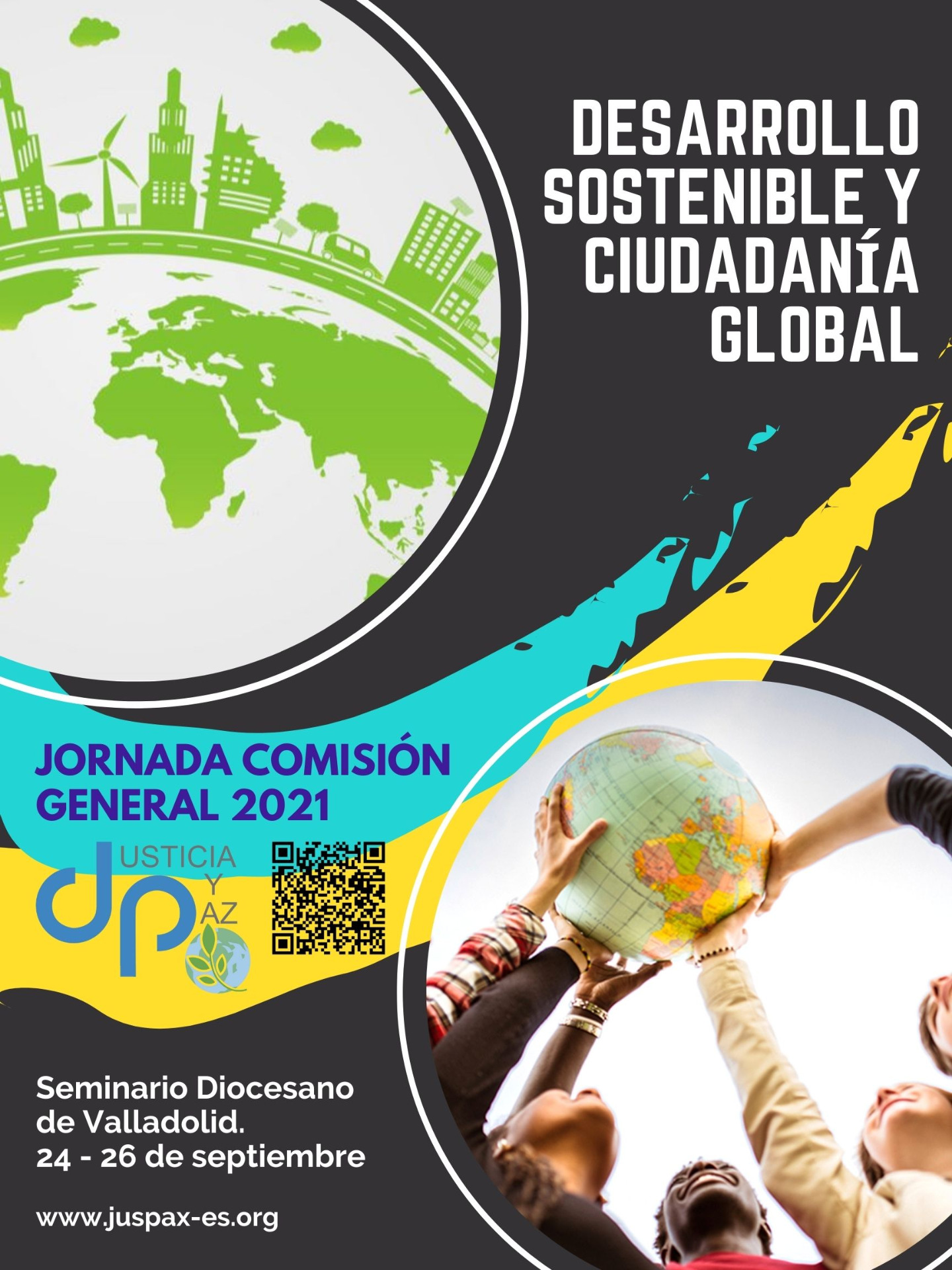Sustainable development and global citizenship
Annual Conference Final Statement in Valladolid of Spanish General Commission for Justice and Peace
We are living in global times that connect development elements that are acknowledged in the 2030 Agenda, and with this meeting we contribute to the analysis in the fields of migration, human rights, new technologies, the interdependence that drives a culture of care, and the urgent need for a change in the economic model.
We hold the Annual Conference of Spanish General Commission for Justice and Peace, organized by the Commission for Justice and Peace of the diocese of Valladolid, from the 24th to the 26th of September in Valladolid. About seventy people representing 7 diocesan commissions, either in person or by videoconference, attended the event. Luis Argüello, auxiliary bishop and secretary general and spokesperson of the CEE; Francisco Javier Alonso, president of the General Commission for Justice and Peace (CGJP); D. Javier Vilanova, auxiliary bishop of Barcelona and accompanying member of the CGJP and D. Carlos Imaz, president of Justice and Peace Valladolid, participated in the opening ceremony. After remembering beloved people who passed before us, such as Antonio Garrosa and Arcadi Oliveres, we talked about one of the origins of Human Rights in the debates of the Junta de Valladolid (1550-1551) where the rights of indigenous peoples were addressed.
In the inaugural conference «Migrants, a paradigm of our times», Mgr. Santiago Agrelo, Emeritus Archbishop of Tangier, reminded us that, we, migrants and people of faith are just traveling in the path of hope, since we do not believe unless we emigrate and we do not migrate unless we believe. It is not only about migrants, it is also about our Christian vocation. He denounced those who use language to prioritize fear and promote hatred against this collective. It is not only about migrants, it is also about the way we act, about the place we want to take in relationships. And that place can be individualism, the utilitarian mentality, indifference, the waste culture, marginalization or exclusion. However it can also be humanity. He invited us to be fraternal and open to dialogue, key elements in Fratelli tutti.
In the first presentation on Saturday, the PhD in Law from the University Carlos III of Madrid, Ms. María José Fariñas, stated that "in this time in which physical security has become more important than other rights, and protest has been criminalized as a problem of public order, we have become uncritical consumers of rights and we forget all about our obligations, which makes necessary a declaration of human obligations, as advocated by Saramago". She proposed the renewal of four pacts that will allow us to consolidate human rights in the current social development: a non-aggression pact between different people. We must learn to deal with plurality from a position among equals. The other pacts would concern the redistribution of wealth among unequals, since structural inequality kills; a pact for the defense and protection of common goods as an alternative to liberal capitalist democracy, and a pact for historical memory to know and explicitly state the root of the problems.
Mr. Javier Sánchez-Monedero, PhD in Information and Communication Technologies and associate researcher at the Data Justice Lab. of the University of Cardiff, addressed the issue of social justice, algorithms and machine learning in the era of "Big Data", denouncing that we live in a world where people are constantly turned into data for a variety of purposes and where discrimination is becoming automated. He gave the example of migrants and refugees who are excluded from the protection of their data. The prediction of algorithms is not impartial and he proposes a collective and ethical intervention in the specifications of the conditions under which these programs are developed. Various associations have emerged to assess the risks and to develop ethical guidelines, codes of professional behavior and various tools such as those of Data Justice and Design Justice.
Ms. María Teresa Martín, PhD in Sociology from the University of Almería shared some of her experiences with projects that protect the vulnerability of humans and their interdependence. The growing individualism of our society does not drive a culture of care. The need for care is inherent to our human condition and differs from person to person, being important who provides the care and how it is provided. Policies must be embodied and located. The work of caregivers is often precarious, poorly recognized and performed mainly by women. Her main proposal is to include the issue of care democratically, with broad participation of all participants, in public policy agendas.
Mr. Santiago Álvarez, PhD in Economics and Director of FUHEM Ecosocial of Madrid, stated that capitalism does not understand the language of basic needs. Therefore, it is wasteful, its objective is asocial, its driving force is the accumulation of capital, which becomes the engine of this impersonal system oriented by the logic of private profit. He suggested a supply system that overcomes the metabolic (ecological) and social fracture, building an economy of care and public systems for welfare provision, recovering the common economy and the control of surplus, democratizing the decision of social investment. All this without forgetting the Pope Francis criteria of the inclusion of excluded people as well as their promotion, the common good and the care of creation, focusing on the "three T's" - three aims, all of which in Spanish, begin with T - shelter, land and work.
We ended Sunday with the Eucharist, presided by Mr. Ricardo
Blázquez, Archbishop of Valladolid. Also in the company of the family of Antonio Garrosa (who passed
away this year): his wife Elena and three of his sons and daughters. All the
participants said goodbye after evaluating the event and proposing future
actions. "The signs of the times clearly show that human fraternity and the
care for creation constitute the only way towards integral development and
peace".

